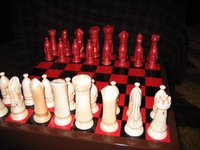Quiet Game Produces High Activity

NOT ALL GAMES, or other forms of recreation, require high amounts of energy or vigorous physical activity. Some extremely enjoyable leisure activities are considered to be passive (rather than active) forms of recreation. Some of these may be enjoyed by simply sitting at a game table, across from one opponent, and even remaining mostly quiet while play is in progress. Such is the case for a game of chess. Chess is perhaps the classic example of a quiet game which produces high activity - not physical activity, but rather a large amount of mental activity.
Most chess players would agree that the best chance for winning requires the use of strategy and tactics. Thinking about moves of game pieces as far ahead as possible is an advantage. Deciding the best approach to take toward the capture of the opponent's game pieces causes the wheels of the mental processes to turn!
Game pieces for chess include kings, queens, bishops, knights, rooks, and pawns. Each player starts with 16 pieces. The chess board consists of 64 squares of alternating dark and light colors. Rules of play are usually included with most chess sets, or they are easily available. It is imperative for players to learn the moves that each game piece can make on the board. It is equally important to know how to capture the opponent's game pieces. The object of the game is to checkmate the opponent's king: to make it impossible for the opponent's king to be able to move without being captured.
The cost for purchasing a chess set varies widely. Inexpensive sets are available at numerous stores. On the other hand, sets which are handsomely or ornately crafted can be quite expensive. A range of prices can be found to fit most any budget!
One of the values of chess as a recreation activity is that it requires concentration. It becomes difficult - if not impossible - for a person playing chess to think about other things. Focusing on the "task at hand" (playing the game) helps bring a release of tension and a relief from the stress of everyday pressures.
Playing chess is a great choice for leisure involvement for individuals who prefer table games or more quiet forms of recreation. However, chess is also an excellent choice as an alternative activity for those who usually select much more physically demanding leisure pursuits.


